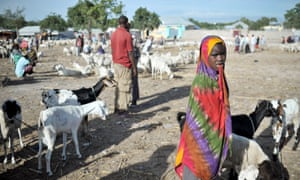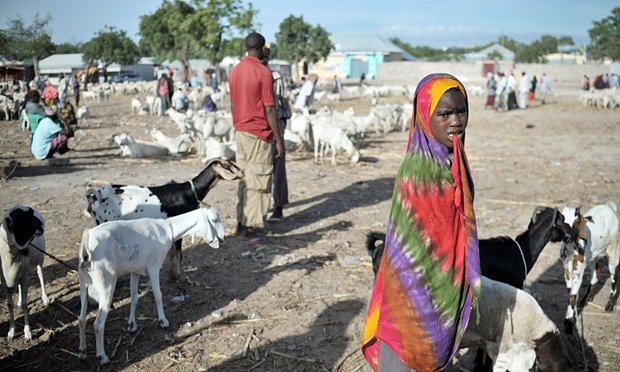Somalia may be wracked by conflict, politically fragile and braced for potentially devastating floods, but Abdusalam Omer believes it is ripe for foreign investment

A busy scene at Bakara animal market in the Somali capital Mogadishu. Site of the notorious Black Hawk Down battle and a former al-Shabaab stronghold, the market is now thriving. Photograph: Tobin Jones/AFP/Getty Images
He admits his job is a tough one – in fact, his wife thinks he is having a “mid-life meltdown” – but the Somali foreign minister Abdusalam Omer is determined to sell the Horn of Africa nation, insisting it has lucrative natural resources that could benefit intrepid investors.
“Somalia can be world leader in livestock,” Omer, a former central bank governor who was appointed minister six months ago, told an audience at London’s Chatham House this week. “We have the most goats. We have agriculture. We need a critical investment to come to Somalia and invest so Somali children can stay home and be happy.”
Somalia has been locked in conflict since the fall of the dictator Mohamed Siad Barre in 1991. Battles between rival warlords brought the country to its knees in the 90s, a disastrous intervention by UN and US forces cemented its reputation as a no-go zone, and, since 2005, the extremists of al-Shabaab have been fighting the government and African Union peacekeepers, known as Amisom.
Al-Shabaab mostly withdrew from the capital Mogadishu in 2011 after an offensive by Amisom troops. Its forces are now based in southern Somalia, but they also carry out bombing attacks and assassinations in the capital, as well as in neighbouring Kenya.
There have been tentative signs of a return to some kind of normalcy – at least in Mogadishu – since President Hassan Sheikh Mohamud took office in 2012. But his government is still fragile, with frequent changes of prime minister, internal squabbling and accusations of corruption.
Although Omer declared that al-Shabaab “is militarily defeated”, he admitted it was still a challenge to protect the population from “opportunistic” attacks.
Al-Shabaab demonstrated its power last week with a devastating attack on an Amisom base in Janale, in the south. The militants said they killed 50 peacekeepers, while other reports claimed 12 soldiers were killed.
Somalia has been locked in conflict since the fall of the dictator Mohamed Siad Barre in 1991. Battles between rival warlords brought the country to its knees in the 90s, a disastrous intervention by UN and US forces cemented its reputation as a no-go zone, and, since 2005, the extremists of al-Shabaab have been fighting the government and African Union peacekeepers, known as Amisom.
Al-Shabaab mostly withdrew from the capital Mogadishu in 2011 after an offensive by Amisom troops. Its forces are now based in southern Somalia, but they also carry out bombing attacks and assassinations in the capital, as well as in neighbouring Kenya.
There have been tentative signs of a return to some kind of normalcy – at least in Mogadishu – since President Hassan Sheikh Mohamud took office in 2012. But his government is still fragile, with frequent changes of prime minister, internal squabbling and accusations of corruption.
Although Omer declared that al-Shabaab “is militarily defeated”, he admitted it was still a challenge to protect the population from “opportunistic” attacks.
Al-Shabaab demonstrated its power last week with a devastating attack on an Amisom base in Janale, in the south. The militants said they killed 50 peacekeepers, while other reports claimed 12 soldiers were killed.
“We should strive for free and fair elections,” he said, before going on to list the conditions that must be in place, including an up-to-date census, registration of voters, and clear delineation of districts.
“Those conditions are not present today. I don’t think they will be present in the near future,” he said.
In a research paper released this week, Jason Mosley, an associate fellow of the Africa Programme at Chatham House, said pressure was still high for an electoral transition.
“The desire for direct elections is in the process of yielding to the reality that there is insufficient time or political will to establish the required legislative and institutional frameworks. However, pressure is mounting to develop an acceptable alternative mechanism in the time remaining,” he wrote.
Somalia is looking to refine a federal system, but Mosley pointed out that respect for minority and smaller clans will be critical. At present, Somalia’s government is based on a clan power-sharing deal – which gives most power to the four biggest clans – but Mosley said that the logic of this “feeds the grievances of smaller groups, allowing continued openings for spoilers.”
Omer was asked about a lack of trust in the government. He did not deny a public lack of confidence, but said: “I’m not selling the government. I’m selling Somalia … It’s a person selling a house. It leaks a bit, some of the doors don’t work but we want to sell it.”
Source: The guardian


Leave a Reply